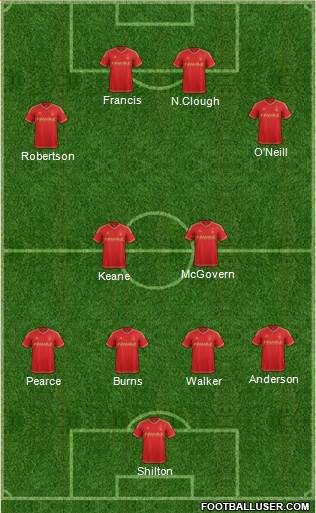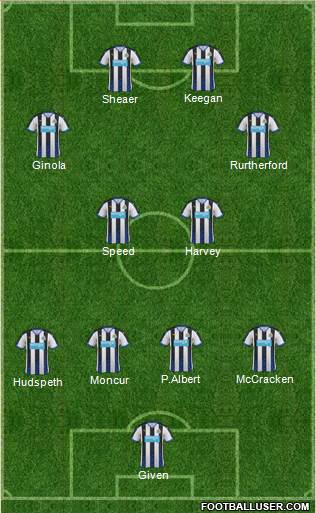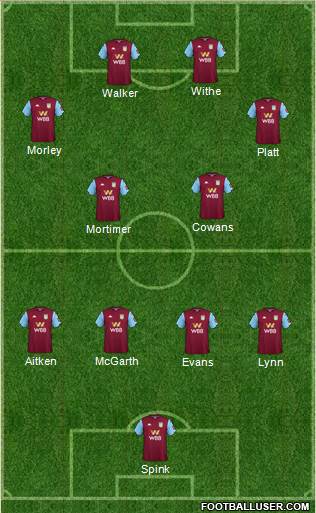This blogger Artur Yanturin of Russia copied many of my blog teams. This blog was one of them. It was my Russia All-Time Team here. His team was written in 2020, but mine was uploaded in 2014. His Spartak Moscow All-Time team entry of was published in October 2020, but mine was uploaded in 2017. His entry of the Dutch-German rivalry between Real Madrid and Barcelona was written in 2020, but mine was uploaded in 2014. He also copied many many of my blog entries.
 |
| European Cup Winner |
Please also see my All-Time World Cup Team Index.
Manchester United, Liverpool, Arsenal,
Chelsea, Tottenham, Manchester City, Everton, Ipswich
Aston Villa, Newcastle United, Nottingham Forest,
Leeds United, Leicester City, West Ham, Blackburn Rovers
Southampton
East Midlands
This is my selection of a 25 member all-time team for the club. The number 25 was chosen because it is the official squad size for the Champions' League.
Founded in 1865, Forest were founder members of the Football Alliance in 1889 and joined the Football League in 1892. Since then they mostly competed in the top two League tiers, excepting five seasons in the third tier. Forest won the FA Cup in 1898 and 1959. Their most successful period was under the management of Brian Clough and Peter Taylor between 1975 and 1993, winning the League in 1978, back to back European Cups in the two years thereafter, four League Cups and two Full Members Cups.
 |
| 1959 FA Cup winner |
Team
GK: Peter Shilton (England)
Peter Shilton is considered one of the greatest keepers ever. He is England's all-time cap record-holder with 125. He earned his first cap in 1970 and his last 20 years later in 1990. He took England to 4th place in the 1990 World Cup. He played for 11 different clubs in his career, all in England. He won two straight European Cups in 1979 and 1980 with Nottingham Forrest. He was PFA Players' Player of the Year: 1977–78, an award rarely won by a goalkeeper.
 |
| Peter Shilton |
Linacre started his career with Derby, where he ony playd two games. He joined Forest in 1899. He was chosen to go on the first foreign tour to South America with his Nottingham club in 1905. In the same year as he appeared for England, he toured Uruguay and Argentina. He appeared twice for England that year, first against Scotland and Wales.
GK: Mark Crossley (Wales)
From 1988 until 2011, he has previously played for numerous clubs in England's top flight, notably for Nottingham Forest, where he became the only goalkeeper to stop a Matthew Le Tissier penalty kick. He has also played for Manchester United, Milwall, Middlesbrough, Stoke City, Fulham, Sheffield Wednesday, Oldham Athletic and Chesterfield. He earned 8 caps playing for Wales between 1997 and 2004.
RB: Viv Anderson (England)
In 1978, Viv Anderson became the first Black player to play for the English senior national team. He would earn 30 caps between 1978 and 1988. He was on two World Cup team: 1982 and 1986, and two European Championshiop team: 1980 and 1988. He was a part of Brian Clough's Nottingham Forrest team that won back-to-back European Cup in 1979 and 1980. He also played for Arsenal, Manchester United and and Sheffield Wednesday.
 |
| Viv Anderson |
CB/ST: Kenny Burns (Scotland)
Kenny Burns arrived at the Birmingham as a defender in 1971, but was converted to striker and earned the first of his 20 international caps in that role soon afterwards. However, after joining Nottingham in 1977, he was converted back into a central defender. Burns was voted FWA Footballer of the Year in 1977–78, as Forest won the First Division title. He was an influential figure to Forest's victory in the 1979 and 1980 European Cup tournaments.
CB: Des Walker (England)
Walker played 59 times for England. He started in all of England;'s games at the World Cup Finals in 1990. He was rated as one of the best defender at that Finals. For club football, he mainly played for Nottingham Forrest and Sheffield Wednesday. He played one season at Sampdoria in then 1992-1993 season. He was Forest's player of the year three times. On four straight occasions at Forest he was selected for the PFA Team of the Year.
 |
| Des Walker |
Born in Scotland, Bob McKinlay was an one club player for Nottingham Forest. He played for them between 1951 and 1969. He bgan in the 2nd divsion with the club, but most of his career was spent in the top flight. He is the club's record appearance holder and won the 1959 FA Cup Final with the club against Luton Town.
CB: Larry Lloyd (England)
Larry Lloyd was remembered for his stints with Liverpool and Nottingham Forest. He was a part of Bill Shankly's great side from 1969 to 1974. He helped Liverpool winning the First Division in 1972-1973, the FA Cup 1973-1974 and the UEFA Cup 1972-1973. He was also a part of Brian Clough's team that won back-to-back European Cup. For England, he played 4 times between 1971 and 1980.
 |
| Larry Lloyd |
Colin Cooper spnet 7 seasons with Middlesbrough in the lower divsions. After playing another two seasons in the lower division with Millwall, he moved to Nottingham Forest in 1993. It was at Forest where Colin arguably played the best football of his career, his form earning him two England caps in 1995. He returned to Middlesbrough in 1998 when it was in the Preimer League.
LB: Stuart Pearce (England)
Stuart Pearce was a club legend with Nottingham Forrest. He was the club's most capped international player with 78 caps between 1987 and 1999. He played at the World Cup Finals in 1990 and the European championship in 1996 at home, where England had the best two results since the World Cup win in 1966. He also played for Wealdstone, Coventry City, Newcastle United, West Ham United and Manchester City.
 |
| Stuart Pearce |
Clark started his career at Crook Town. He started his professional career at Newcastle United, and played a total of 464 games for them between 1962 and 1975. He then joined Nottingham Forest, and helped them win promotion in 1977, and he played for them in the 1979 European Cup Final, where they beat Malmö FF
CM/DM: Roy Keane (Ireland)
Keane was the captain of Manchester United from 1997 to 2005, where he won one Champions' League, 7 Preimer League titles and 4 FA Cups. He was the PWA Player of the Year in 2000. He had 67 caps. He played for Ireland at the 1994 World Cup Finals in the USA, but was sent home 4 years later before the start of the World Cup Finals in 2002. He later played for Celtic in Scotland after leaving Manchester United.
CM: John McGovern (Scotland)
John McGovern played under manager Brian Clough for Derby, Leeds United and finally, Nottingham Forrest. He is most famous for captaining the Nottingham Forest side that won the European Cup twice. At the age of 19 he became the youngest player to play in all four divisions of the Football League. During his playing career he won promotion with Hartlepools United, Derby County and Nottingham Forest. At the end of his career, he also played for Bolton Wanderers F.C.
 |
| John McGovern |
Gems played for a few clubs before Peter Taylor took him to Derby in 1970. He won two league titles before he followed brian Clough and Peter Taylor to Nottingham Forest. He later played for r Birmingham City and Jacksonville Teamen. Gemmill played 43 times and scored eight goals for Scotland, and captained the team on 22 occasions. Against Netherlands in the 1978 World Cup Finals, he scored one of the greatest goals in the World Cup Finals.
CM: Steve Hodge (England)
Steve Hodge joined his boyhood club Nottingham Forest as an apprentice in 1980 and helped the club to reach the semifinal of the UEFA Cup. He also played for Aston Villa, Tottenham Hotspurs and Leeds United. Capped 24 times fro England. He went to both 1986 and 1990 World Cup Finals. He exchanged shirt with Diego Maradona after the infamous quaterfinal match vs Argentina in 1986.
RM/CM: Martin O'Neill (Northern Ireland)
Starting his career in his native Northern Ireland, O'Neill moved to England where he spent most of his playing career with Nottingham Forest, with whom he won the European Cup twice, in 1979 and 1980. He also played for Manchester City, Norwich, Notts County, etc. He was capped 64 times for the Northern Ireland national football team, also captaining the side at the 1982 World Cup.
RW: Steve Stone (England)
Stone began his career at Nottingham Forest, where, despite suffering three broken legs, he managed to establish himself as a vital team player, and also earned a call up to the England squad, making his international debut in 1995 against Norway. He went on to earn nine caps, scoring twice, and was part of Terry Venables' squad for Euro 96.
LW: John Robertson (Scotland)
John Robertson played for Nottingham Forest when they were at the peak of their success under manager Brian Clough, notably scoring the only goal in a 1–0 victory in the 1980 European Cup Final against Hamburger SV. He also played 28 times for Scotland, scoring the winning goal against England in 1981 and against New Zealand in the 1982 FIFA World Cup. He also played for Derby between two stints with the Forrest.
 |
| John Robertson |
Storey-Moore was playing junior football in Scunthorpe before he joined Nottingham Forrest in 1961. From 1972 to 1974, he played for Manchester United, but an injury ended his career. He had brief stint everywhere after 1974. Storey-Moore played once for England against Netherlands in 1970. He was voted in the Best XI for Nottingham Forest.
FW: Stan Collymore (England)
Stan Collymore held the English transfer record when he moved from Nottingham Forest to Liverpool for £8.5 million in 1995. He formed a great partnership with Robbie Fowler. Unfortunately, he never lived up to expectation after his first few seasons. He left Liverpool in 1997, where he played for Aston Villa, Leicester City, Fulham, Bradford and Real Oviedo. At the international level, he was capped three times at senior level by the England national football team.
 |
| Stan Collymore |
Grenville Morris was one of the greatest players of his generation and was known as "The Prince of the Inside-Lefts". He still holds Forest's all-time goal scoring record with 217 in all competitions. He won his first full international Welsh cap at the age of 18 in 1896 against England, and went on to play 21 times for his country,
ST: Wally Ardron (England)
Wally Ardon joined Rotherham United from Denaby United in 1938, and went on to score 98 Football League goals for Rotherham, either side of World War II. He joined Nottingham Forest in 1949 after his time at Rotherham, and holds the record for scoring most Forest league goals in one season (36 in 1950–51). He retired in 1955.
ST: Nigel Clough (England)
Nigel Clough is most notable for his time as a player at Nottingham Forest, where he played over 400 times in two separate spells, mostly under the managership of his father Brian and scored 131 goals throughout his career making him the second highest scorer in the club's history. He subsequently had spells with Liverpool, Manchester City and Sheffield Wednesday. He was capped 14 times between 1989 and 1993.
 |
| Nigel Clough |
ST: Tony Woodcock (England)
Woodcock broke into the Forest first team in 1976–77, helping the team to promotion to the First Division. Under Brian Clough, Forest went on to win the First Division title and Football League Cup in 1978 (Woodcock winning the PFA Young Player of the Year award that year as well), and the European Cup in 1979. In 1986, he joined FC Köln in 1979 and later played for Arsenal. Capped 42 times and went to Spain 1982.
ST: Trevor Francis (England)
From 1971 to 1979, Francis played for Birmigham Town. He was England's first £1 million player when he moved from there to Nottingham Forrest. He was known for winning the European Cup with Nottingham Forest in 1979 and 1980. His career also took him to Manchester City, Birmingham, Detroit Express, Sampdoria, Atlanta, etc. He played for England 52 times. He went to the 1982 World Cup Finals.
 |
| Trevor Francis |
Honorable mention
Brian Laws (England), Des Lyttle (England), Johnny Metgod (Netherlands), Michael Dawson (England), Steve Chettle (England), Wes Morgan (Jamaica), Joe McDonald (Scotland), Julian Bennett (England), Pierre Van Hooijdonk (Netherlands), Ian Woan (England), Ian Bowyer (England), Jermaine Jenas (England), Jeff Whitefoot (England), Jack Burkitt (England), Gary Crosby (England), Barry Lyons (England), David Phillips (Wales), Garry Birtles (England), Ian Storey-Moore (England), Neil Webb (England), Stewart Imlach (Scotland), Tinsley Lindley (England).
Squad Explanation
-- Nottingham Forrest is unlike the other all-time teams I have created. They are much smaller than the other clubs. They also spent many years in the lower divsion, but they are two-time European Cup champions. Without that achievements, I would not consider making this team.
-- The book "Official History of Nottingham Forest has the following players as their Best XI: Peter Shilton, Viv Anderson, Des Walker, Kenny Burns, Stuart Pearce, Martin O'Neill, Roy Keane, Archie Gemmill, Ian Storey-Moore, Trevor Francis and John Robertson.
-- In the beginning, I left out Archie Gemmill and Ian Storey-Moore. In 2019, I edited the team. Archie Gemmill replaced Neil Webb. Ian Storey-Moore replaced Stewart Imlach.
-- Steve Hodge edged out Neil Webb for the last spot. Both players have similar numbers for both Nottingham Forrest and England. Hodge was born in Nottingham and was a home grown player. So I took him over Webb.
-- I wanted to keep Stewart Imlach because he won the 1959 FA Cup. He was the only player selected from that team. Now, he is on honourable mention.
-- Ten players won one or both of Nottingham Forrest's two European Cup titles. I selected 10 players from those teams. They Peter Shilton, John McGovern, Kenny Burns, Viv Anderson, Trevor Francis, Tony Woodcock, Martin O'Neill, John Robertson, Larry Lloyd and Frank Clark. Woodcock left for Koln in the Bundesliga after the first title. Chris Wood who later found successes was a backup goalkeeper. His career over here was limited. So I did not put him anywhere.
-- Peter Shilton is known to be England's greatest goalkeeper. His time with Nottingham Forrest was his most decorared career. As mentioned above, Chris Wood only served as a backup goalkeeper.
-- Des Walker earned fourth successive selection for the PFA Team of the Year and Stuart Pearce did it 5 straight times.
-- Viv Anderson is known as the first Black player to earn a senior cap with England.
-- John McGovern played under manager Brian Clough for Derby, Leeds United and finally, Nottingham Forrest. John O'Hara also played for all three clubs. Archie Gemmill also played for Clough with Derby, but he never played for Leeds United. Colin Todd joined Nottingham Forrest in 1982.
-- Nottingham Forrest reached the semifinal of the 1984 UEFA Cup. It was the best result since the two European Cup victories in the late 1970's.The club's best result in Europe without Peter Taylor by Brian Clough's side.
-- From 1988 to 1990, Nottingham Forrest won back-to-back League Cup. Nigel Clough, Steve Hodge, Stuart Pearce and Des Walker were selected from the team.
-- In 1995, Nottingham Forest finished third in the Premiership. Their manager was Frank Clark who also made my all-time team as a leftback. It is their best season in recent years. Stuart Pearce was their captain. Liked Clark, he was a leftback. Stan Collymore, Neil Webb, Steve Stone and Mark Crossley also made my all-time team.
-- Nigel Clough was Nottingham Forrest's second all-time leading scorer. He was on the team, not because of his name. He just happened to be Brian Clough's son. When he was transfered to Liverpool, he was one of Liverpool's most expensive ever signing.
--Andy Reid only played in the lower division for Nottingham Forest.
-- Roy Keane's transfer out of Nottingham Forest was a British record at the time. He is not a home grown, but he started playing for the club's under-21 team. I do consider him a product of the club.
-- Michael Dawson and Jermaine Jenas were famous playing for Tottenham Hotspurs respectively. However, they came from Nottingham Forest's academy.
-- I found a player named Tinsley Lindley. He scored 14 goals for England in 13 internationals. Lindley was given an O.B.E. in January 1918 for his work during World War One and in 1935 he was also awarded the King George V Silver Jubilee Medal. He played his entire career with this club. I put him on honorable mention.
-- Tony Woodcock was homegrown. He broke into the Forest first team in 1976–77, helping the team to promotion to the First Division. He was the PFA Young Player of the Year: 1977–78.
Formation


























